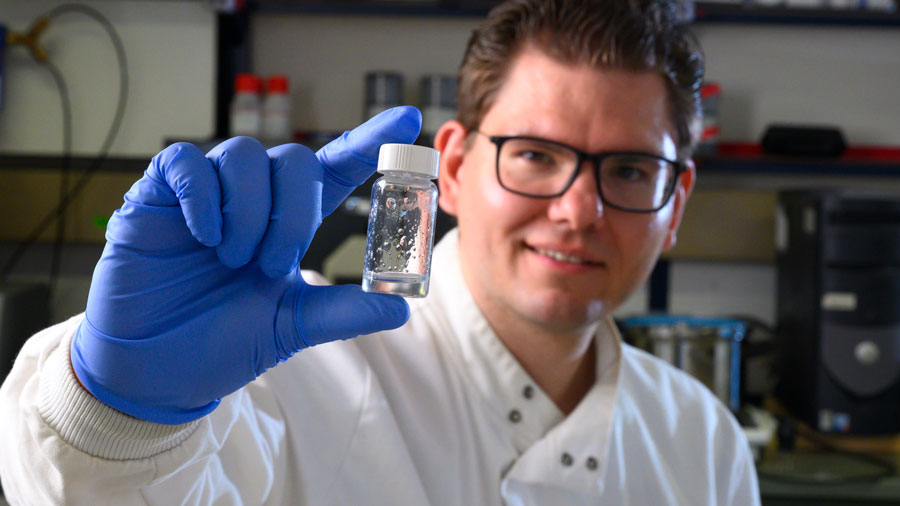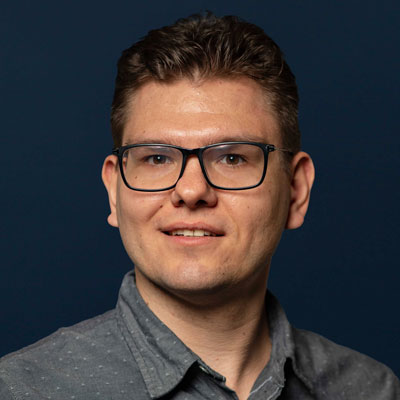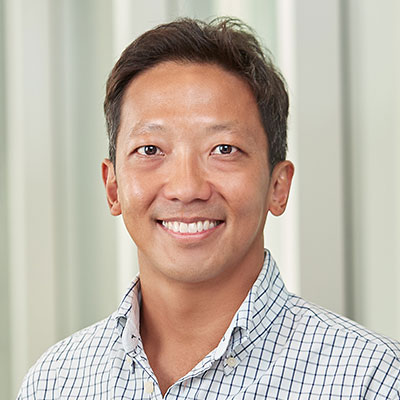Space—the final frontier?

Jacek Wychowaniec is designing peptide inks that may one day help astronauts heal their own wounds in space. A new grant now allows him to test his peptides in a simulated microgravity environment on Earth, and he hopes to eventually shoot his experiments into space.
With both public and private space agencies pushing for new flights to the Moon and beyond, the survival and wellbeing of future astronauts is becoming a hot topic for science. The hostile environment beyond Earth’s atmosphere is known to affect and suppress the function of our immune cells, resulting in a reduced response to pathogens and healing. The research of Jacek Wychowaniec, Research Scientist at AO Research Institute Davos (ARI), focuses on wound healing and how biomaterials, delivered as a hydrogel, could possibly regulate and accelerate the healing process in space.
The biomaterials that Wychowaniec designs are self-assembling peptides, which offer unprecedented opportunities to control nanostructure and chemical attributes to investigate and manipulate cellular signals, and to potentially change the course of inflammation during the progression of various diseases. Wychowaniec and his co-researcher Jeremy Teo, an assistant professor of mechanical engineering and bioengineering at NYU Abu Dhabi, have recently received new funding from a Haute école spécialisée de Suisse occidentale Consolidation Grant to test these peptides—which they’ve named “Space ImmunoBioinks”—in an artificial micro-gravity environment, designed to mimic the conditions in space.
With both public and private space agencies pushing for new flights to the Moon and beyond, the survival and wellbeing of future astronauts is becoming a hot topic for science. The hostile environment beyond Earth’s atmosphere is known to affect and suppress the function of our immune cells, resulting in a reduced response to pathogens and healing. The research of Jacek Wychowaniec, Research Scientist at AO Research Institute Davos (ARI), focuses on wound healing and how biomaterials, delivered as a hydrogel, could possibly regulate and accelerate the healing process in space.
The biomaterials that Wychowaniec designs are self-assembling peptides, which offer unprecedented opportunities to control nanostructure and chemical attributes to investigate and manipulate cellular signals, and to potentially change the course of inflammation during the progression of various diseases. Wychowaniec and his co-researcher Jeremy Teo, an assistant professor of mechanical engineering and bioengineering at NYU Abu Dhabi, have recently received new funding from a Haute école spécialisée de Suisse occidentale Consolidation Grant to test these peptides—which they’ve named “Space ImmunoBioinks”—in an artificial micro-gravity environment, designed to mimic the conditions in space.

“We are of course hoping that this grant will get us into the position to apply for the next step—liftoff.”
Jacek Wychowaniec
For healthy wound healing in space, it is envisioned that a rapid seal must be applied, and that subsequently the space-induced dysfunction of an astronaut’s immune cells must be modulated to operate in an appropriate and healthy manner. From data obtained from their earlier research, Wychowaniec and Teo hypothesize that the Space ImmunoBioinks can serve both purposes.
“I had originally planned to design nine different peptide sequences, but we’ve now extended this to twelve, and two or three are looking promising from our preliminary research,” explained Wychowaniec. Although a lot is already known about peptides and there are certain criteria to the design of a potentially interesting sequence, “there is still a fun part” to his work, and even placing the same amino acid in different positions can completely change the polarization state of immune cells.
To further investigate the potential of their Space ImmunoBioinks, the researchers will create a tiny lab-on-a-chip which is then placed onboard the random positioning machine in Abu Dhabi that provides microgravity conditions. “Our approach and methodology are unique because it is so small,” explained Teo. “This makes microgravity research—which would normally be very expensive—affordable even with relatively small grants like ours.”

“Moving forward, the plan would be to eventually put our experiment on a satellite—or even a space station.”
Jeremy Teo
Despite their excitement about this combination of ARI’s cutting-edge biomaterials research and NYU Abu Dhabi’s unique microgravity device—both researchers have their minds set for the ultimate testing ground: actual space.
“Moving forward, the plan would be to eventually put our experiment on a satellite—or even a space station,” said Teo. Like many other researchers in the field of “space science,” he and Wychowaniec are envisioning a fully automated system which would, once started, operate autonomously. “This kind of setup would get us real-time data, sent back to Earth almost simultaneously,” explained Wychowaniec.
For now, however, the Space ImmunoBioinks research team is keeping its feet firmly on the ground. “We have our work cut out here on Earth thanks to the next 18 months of funding,” said Wychowaniec. “But we are of course hoping that this grant will get us into the position to apply for the next step—liftoff.”
“Moving forward, the plan would be to eventually put our experiment on a satellite—or even a space station,” said Teo. Like many other researchers in the field of “space science,” he and Wychowaniec are envisioning a fully automated system which would, once started, operate autonomously. “This kind of setup would get us real-time data, sent back to Earth almost simultaneously,” explained Wychowaniec.
For now, however, the Space ImmunoBioinks research team is keeping its feet firmly on the ground. “We have our work cut out here on Earth thanks to the next 18 months of funding,” said Wychowaniec. “But we are of course hoping that this grant will get us into the position to apply for the next step—liftoff.”
You might also be interested in:
- The work of ARI’s Regenerative Orthopaedics team
- The story of former Regenerative Orthopaedics fellow Maria Antonia Gomez
- ARI’s Sibylle Grad receives Women’s Leadership Award
- 33rd Annual Congress of the European Society for Biomaterials held in Davos

